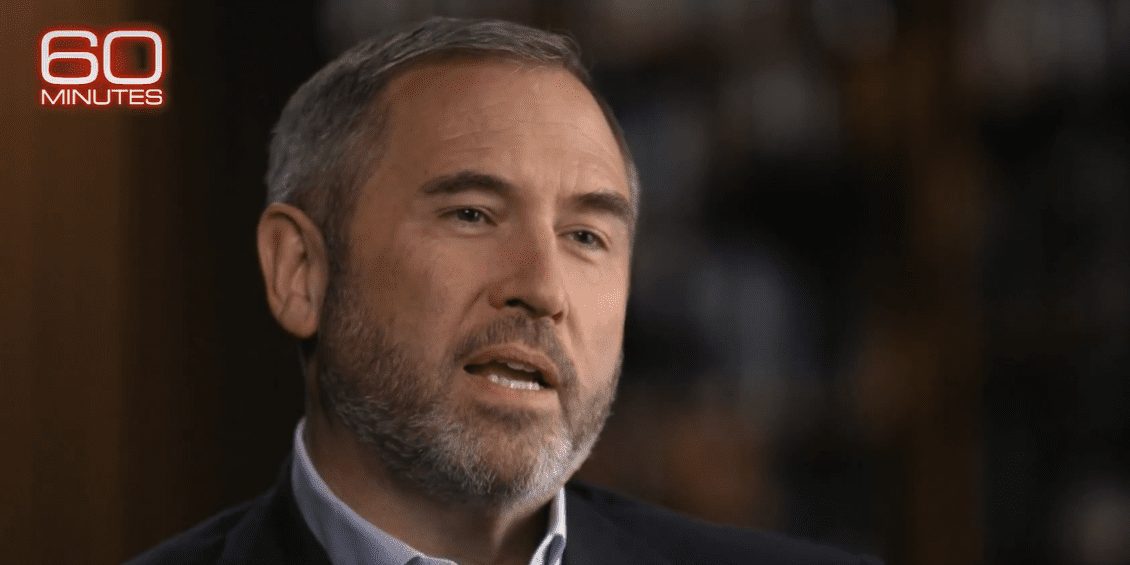In a recent episode of CBS’s “60 Minutes,” Brad Garlinghouse, the CEO of Ripple, made a notable appearance to delve into the relationship between cryptocurrencies and politics. However, many in the crypto community felt that the segment was lacking, as Garlinghouse’s remarks were sparse and the overall narrative seemed superficial and unbalanced.
Garlinghouse Critiques CBS
During the roughly 13-minute feature, Garlinghouse was questioned about the crypto sector’s significant role in the U.S. presidential elections, particularly regarding the substantial donations made by crypto companies. CBS reported that Ripple and other firms collectively donated about $144 million to super PACs supporting candidates from both political parties.

Garlinghouse highlighted the impact of these contributions on election results, citing key victories for Democratic senators in Michigan and Arizona. He remarked, “Did we influence the election of Alyssa Slotkin in Michigan? Yes, definitely. Did we impact Gallego’s election in Arizona? Absolutely.”
When discussing regulatory issues, Garlinghouse stressed the need for clear legislative guidelines in the crypto sector. He advocated for “clear rules of the road” to keep the U.S. at the forefront of the industry, rather than losing ground to less regulated jurisdictions. “We’ve been advocating for regulations—just provide us with clear guidelines,” he said.
The Ripple CEO commended bipartisan initiatives, pointing to the Fit 21 bill as a crucial step towards a more balanced regulatory approach that would shift some oversight from the SEC to the Commodity Futures Trading Commission (CFTC). Regarding the ongoing lawsuit about XRP, Garlinghouse briefly mentioned that the claim against Ripple was that its XRP sales constituted unregistered securities. He expressed skepticism about the security classification of XRP, stating, “Having attended Harvard Business School, I never doubted that XRP could be considered a security.”
Garlinghouse also reflected on the shifting political landscape, noting Donald Trump’s recent change in position on cryptocurrency. He commented on Trump’s crypto project, saying: “Whether this creates a conflict of interest is up to the voters, and they have made their choice.”
After the broadcast, Garlinghouse expressed his disappointment via X, criticizing the show’s lack of coverage on significant issues, particularly a ruling by Judge Analisa Torres that clarified XRP is not a security. He remarked, “It’s astonishing that 60 Minutes omitted the fact that a Federal Judge ruled XRP is not a security… Gensler’s supporter (John Reed Stark) is aware of this, despite his remarks aired by 60 Minutes.”
He added: “Claiming that crypto lacks utility echoes the early misconceptions about the Internet—that it was merely a platform for illicit activities. […] Today, even JPMorgan is recognizing the potential of blockchain… (ironically, 60 Minutes neglected to mention that Ripple facilitates billions of dollars in KYC-compliant transactions for our institutional clients using XRP for more efficient cross-border payments compared to traditional systems.)”
Industry Reactions
Perianne Boring, the Founder and CEO of The Digital Chamber, also criticized the segment on X, labeling it a “missed opportunity” for a well-rounded dialogue. She argued that the segment inaccurately depicted crypto advocacy as a threat to democracy while neglecting the fundamental First Amendment protections surrounding free speech and property rights linked to cryptocurrencies.
Boring stated, “CBS News failed to uphold First Amendment principles by omitting these essential truths. Instead, it framed businesses’ advocacy for these rights as unethical lobbying, misrepresenting the critical issues in the crypto discussion.”
She further argued that the segment overly relied on John Reed Stark, a former SEC official with limited credibility in the crypto domain, which diminished the alternative viewpoint presented. “This sensationalized portrayal ignored fundamental facts: crypto transactions are recorded on a public, immutable ledger—the blockchain. […] An expert in crypto crime would have provided a nuanced, evidence-based perspective. Instead, 60 Minutes amplified a less credible voice, damaging its own legitimacy. […] It’s surprising that 60 Minutes did not counter such easily disputed claims,” she pointed out.
Boring also questioned the portrayal of the SEC’s position, emphasizing the agency’s regulatory shortcomings, such as the failure of oversight in the FTX scandal. She argued that attributing FTX’s failure to the crypto industry itself overlooks the absence of a coherent regulatory environment in the U.S. that allowed FTX to flourish and ultimately fail. “If the U.S. had established a clear, consistent regulatory regime, domestic exchanges could have thrived under proper oversight to protect investors and prevent fraud,” she concluded.
As of this report, XRP was priced at $2.37.




